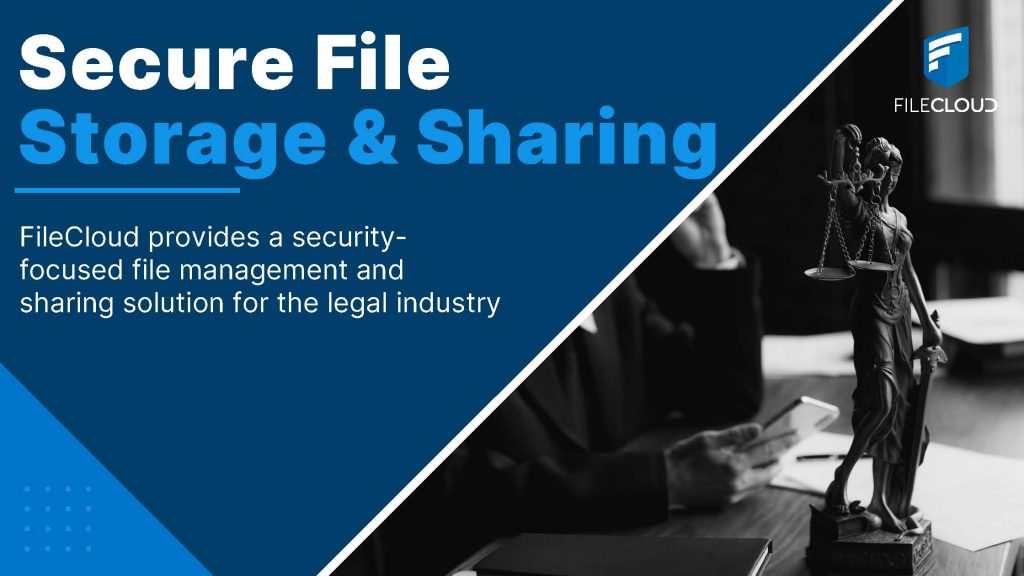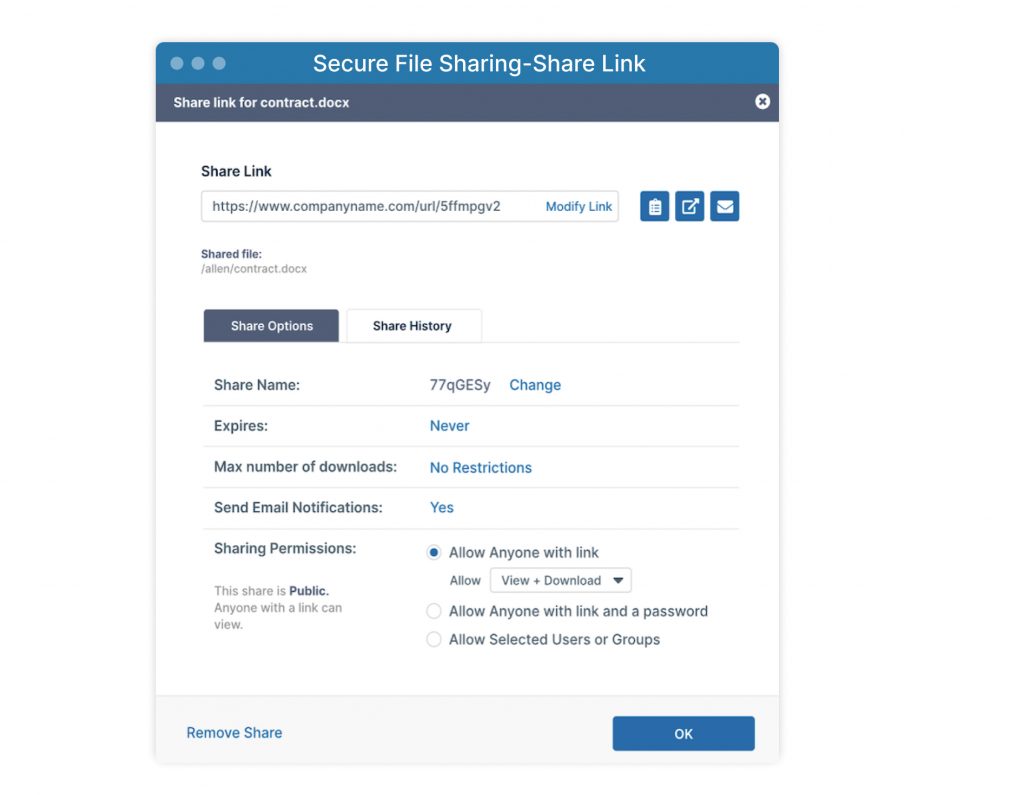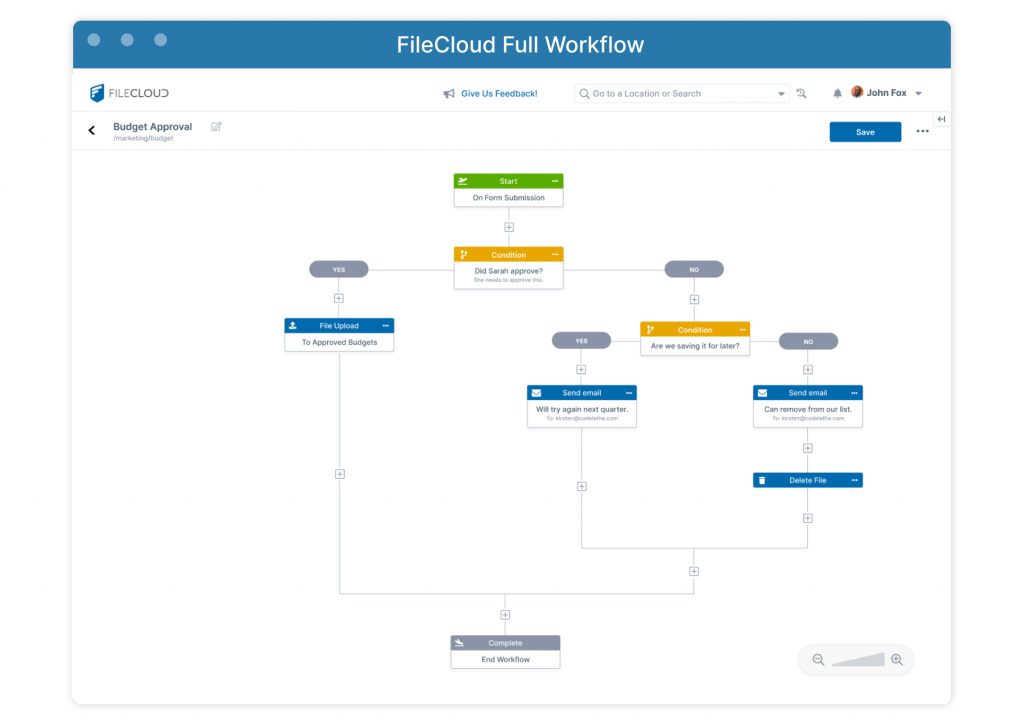
Secure file sharing has become a necessity in almost all industries. From small businesses that want to easily share files with their clients, to large corporations that need specific compliance and governance regulations, secure file sharing is an aspect of business that all companies need to consider.
The legal industry is no exception. In fact, given the security needed for the sensitive materials legal professionals work with, secure file sharing should be a top consideration for any firm or business within the industry.
What is Secure File Sharing?
Because so much of work is now done online, most people share files without ever considering what they’re doing—or if what they’re doing is secure. Have you ever sent a file to someone from Google Drive or Dropbox? If so, then you’ve shared files. Of course, both Google Drive and Dropbox have security protocols in place, but those protocols still might not fit your company’s needs.
Secure file sharing is just sending files from one person to another while knowing that those files (especially ones with sensitive information) can’t be accessed by a hacker or unauthorized person.
This is important for many industries, but it is vital for those working within the legal industry. Because those in the legal industry work with sensitive and often confidential documents and media, it is necessary for anyone sharing files to be certain that their clients’ and firm’s information is secure.
There are so many different file sharing systems now that selecting one for your company can feel overwhelming. However, there are specific features you can look for that are important for the legal industry to have in their file sharing systems.
Let’s go over those features now.
File Sharing Features for the Legal Industry
Legal professionals and law firms often face regulations that require them to handle confidential data in a secure and compliant way. Additionally, all major companies dealing with law firms expect top security due to exchange of proprietary information.
Security
It’s important that any file sharing system you’re using lists security as one of its top priorities. Given the sensitive nature of many of the documents and media used within the legal industry, it’s important that your security is top-notch. Options like antivirus and ransomware protection, end-to-end encryption, and secure cloud storage are all important aspects of secure file sharing. Additionally, permission settings should be able to be customized by the administrator. Ideally, a secure file sharing platform will provide access to users and guests to ensure only authorized individuals can interact with confidential files.

Figure 1: Secure Link
Cloud Storage and Hosting Capabilities
There are many different options when it comes to storage for file sharing systems. One reason many people use file sharing systems is because of their cloud storage capabilities. Cloud storage allows users to access their files from any device. This is especially helpful as more and more companies turn to remote work.
Cloud storage services are typically divided into three options: private, public, and hybrid. The best option for a file storage and sharing platform will depend on the regulatory, user, and data requirements of your firm or business.
Private or on-premises hosting means to host the data and file sharing platform on your own server, behind a firewall. Some companies prefer to store everything on their own server as this allows them to have complete control over their data.
Public cloud services host the file storage and sharing platform on behalf of their client in their data centers (like Dropbox and Google Drive). There are fewer options for customization or security settings, but this can be a good option for firms needing scalability without the responsibility of managing the cloud infrastructure directly.
Hybrid services typically combine public and private cloud storage solutions, so that clients have both an on-premises server for highly sensitive data combined with a public cloud service for archived data.
Retention Policies
Specific retention policies give admins the ability to implement types of hierarchical holds, including admin hold, legal hold, trash retention, and archival. These policies are attached to files and folders.
- Admin Hold – This type of hold outranks all other policies and prevents updating/deleting content for an indefinite period.
- Legal Hold – Designed to retain data for important legal cases or discoveries. During this time, file modifications are not allowed.
- Trash Retention – An action that can be set to automatically delete all files in trash bins permanently off the sever.
- Archival – This helps you move and store old content over the long term, with no deletion allowed until a specified time.
Legal hold is an especially important requirement for a file sharing solution used by the legal industry. Look for file sharing systems that offers options for legal hold—beyond retaining specific files, users will receive a notification telling them not to delete electronic or paper documents that are important for a legal case.
Governance and Regulatory Compliance
Governance and retention policies are often a vital part of working within the legal industry. That’s why it’s important to be able to set retention policies based on your regulatory requirements.
Some file sharing systems even offer compliance systems that help your administrator meet governance requirements for ITAR, HIPPA, GDPR, and more. These compliance configurations combine retention policies with other security and administrative features like metadata, content classification, audits, Data Leak Protection, and Digital Rights Management.
Audits
Advanced audit-log systems are an important part of file sharing systems, but they can be especially important for the legal industry. Audit logs (including what, when, who, where, and how) are important for administrators as they can see file actions, including who is accessing/using files.
DRM (Digital Rights Management)
DRM is an important part of any file sharing system, but it’s vital for the legal industry to be able to control who is accessing/viewing/using their files. DRM systems usually have the ability to control who shares, screenshots, and copies your data.
Customization
Customization is a key factor when considering your file sharing system. Some file sharing systems offer some limited customization of policies and governance, but many systems do not allow changes to their systems. However, it’s important for those within the legal industry to set the security, policies, storage, and DRM capabilities based on their company’s needs.
Client Portal
Many companies are now looking for the ability to give their clients a client portal. Client portal software allows companies to give their customers a place to access confidential documents securely. These portals are usually accessed with a password and allow customers to review, download/upload documents and other media. File sharing systems often offer the option to create your own type of client portal, without the need for extra software.
Because the legal industry works with clients who often have to provide sensitive documents, having a secure portal that clients can access will provide ease of mind. It’s also important to look for file sharing systems that will allow you to have free guest accounts that will still allow uploads/downloads and communication.
Branding
Keeping your branding the same throughout all your systems is an important part of establishing your company’s brand and identity. Look for a file sharing system that allows you to add your own logo, name, and create a custom URL.
Ease-of-Use
While your IT manager might understand the ins and outs of complicated technology, it’s important that your file sharing system is easy-to-use and understand for all users. Make sure that both your employees and clients can access the system easily and quickly learn how to share their files securely.
These are the most important features when it comes to making sure you have a file sharing system that works for the legal industry. Now it just comes to selecting the specific system.
FileCloud as a Secure File Sharing System
There are many systems to pick from, including options such as Google Drive, Dropbox, and OneDrive, but we think that FileCloud sets itself above these as it has all the capabilities needed for working in the legal industry, and more.
FileCloud offers enterprise-level security like 256-bit AES SSL encryption at rest and SSL/TLS protocols for data in transit, SSO (single sign-on), Active Directory integration, two-factor authentication, automatic anti-virus scanning of files (when uploaded) and more.
FileCloud’s Governance and Retention Policies
FileCloud understands the importance of governance for the legal industry, and that's why there are totally customizable classification and retention policies available.
Retention policies allow you to automate certain actions when it comes to managing and organizing your documents. This policy-based automation helps secure your content and gives you total control over the document life cycle.
Within the FileCloud policy system you can create policies that restrict how files and folders are deleted/edited which helps ensure the security of your content. FileCloud's retention policies are hierarchical, which means you can select the policy that best protects and retains specific types of digital content.
These hierarchical retention policies support document life cycle management for the legal industry. Policies include admin hold, legal hold, retention, trash retention, and archival. Within the FileCloud system, you can apply these retention policies to files and folders and customize policies based on the needs of your business.
FileCloud also offers options for smart content classification, custom metadata, and DLP (data loss prevention). Legal industries can use many of these features in different ways, such as creating a metadata tag for legal articles or other data which can then be applied using smart classification.
FileCloud’s DRM Capabilities
FileCloud offers advanced DRM capabilities, including restricted sharing, prevention of screenshots, and copying of data. Because security is such an important factor to all file sharing, all DRM files are protected with AES-certified 256-bit encryption and SSL/TLS protocols.
FileCloud Makes Work Easier
FileCloud recently released a new feature called Workflow Automation. This new feature helps users work smarter by providing the ability to build simple to complex workflows that streamline important business processes.
Managers can create and share workflows for everything from simple tasks like signature retrieval to more complex work like contract reviews.
This can especially be helpful for those working in the legal industry as it can automate and speed up tasks like contract and patent approval and new policy review.
 Figure 2: FileCloud Full Workflow
Figure 2: FileCloud Full Workflow
Automating tasks is easy with FileCloud’s no-code, drag-and-drop tool that helps build workflows. Managers can even share custom workflows with their teams to help prevent errors and accomplish important objectives.
Running workflows can be viewed in a dashboard so you can see work happening in real-time, correct any oversights in automation, and download reports with a click of a button.
Making Your Business More Secure
FileCloud is always working to make customer’s lives easier, including the option to create a client portal, branding, and complete customization options. But you don’t have to take our word for it. Look what these other law firms have to say about working with FileCloud.

Figure 3: Legal Industry Customer 1
Figure 4: Legal Industry Customer 2
Figure 5: Legal Industry Customer 3
As we said, we think FileCloud is a superior option, but there are many to choose from when looking for a secure file sharing system.
The most important thing to remember when selecting a file sharing system is that it has all the capabilities and features you need to succeed at business, including security, customization options, and DRM.
Secure file sharing is only going to become more important over the years. Making sure you have a system in place that can adapt to changing requirements will put you ahead of your competitors.
Get started secure file sharing today by getting a free trial of FileCloud

Jr. Content Marketing Strategist